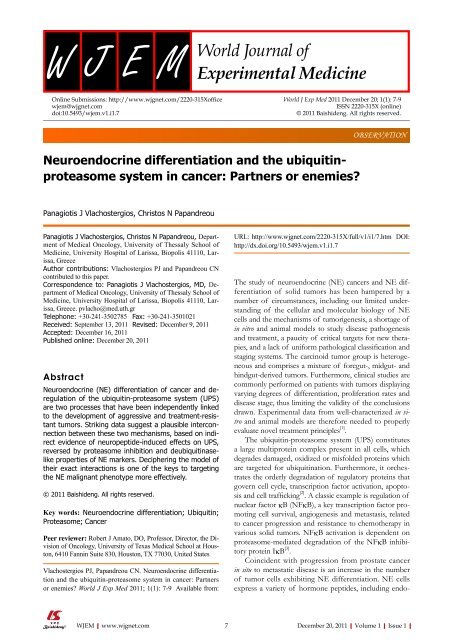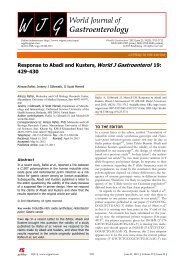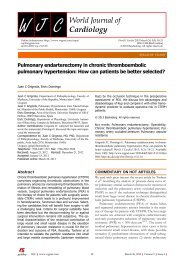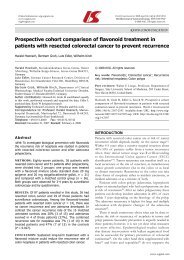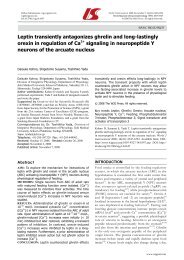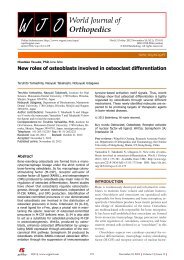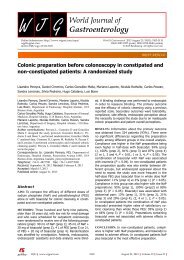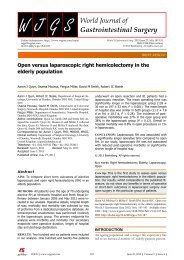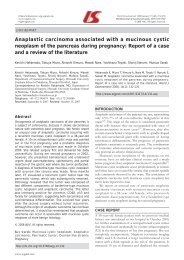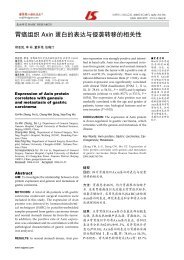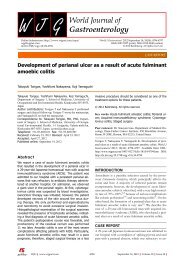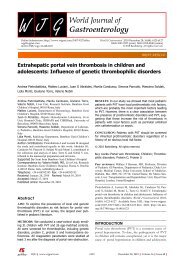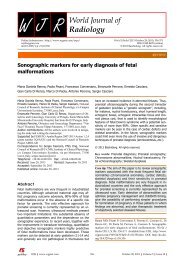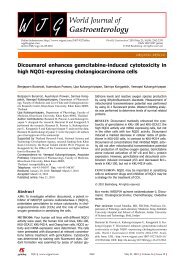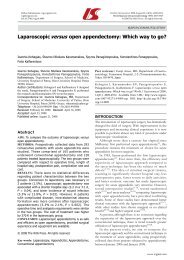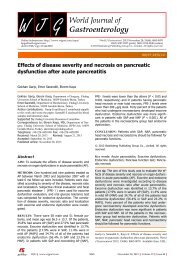World Journal of Experimental Medicine
World Journal of Experimental Medicine
World Journal of Experimental Medicine
Create successful ePaper yourself
Turn your PDF publications into a flip-book with our unique Google optimized e-Paper software.
W J E M<br />
Online Submissions: http://www.wjgnet.com/2220-315X<strong>of</strong>fice<br />
wjem@wjgnet.com<br />
doi:10.5493/wjem.v1.i1.7<br />
Neuroendocrine differentiation and the ubiquitinproteasome<br />
system in cancer: Partners or enemies?<br />
Panagiotis J Vlachostergios, Christos N Papandreou<br />
Panagiotis J Vlachostergios, Christos N Papandreou, Department<br />
<strong>of</strong> Medical Oncology, University <strong>of</strong> Thessaly School <strong>of</strong><br />
<strong>Medicine</strong>, University Hospital <strong>of</strong> Larissa, Biopolis 41110, Larissa,<br />
Greece<br />
Author contributions: Vlachostergios PJ and Papandreou CN<br />
contributed to this paper.<br />
Correspondence to: Panagiotis J Vlachostergios, MD, Department<br />
<strong>of</strong> Medical Oncology, University <strong>of</strong> Thessaly School <strong>of</strong><br />
<strong>Medicine</strong>, University Hospital <strong>of</strong> Larissa, Biopolis 41110, Larissa,<br />
Greece. pvlacho@med.uth.gr<br />
Telephone: +30-241-3502785 Fax: +30-241-3501021<br />
Received: September 13, 2011 Revised: December 9, 2011<br />
Accepted: December 16, 2011<br />
Published online: December 20, 2011<br />
Abstract<br />
Neuroendocrine (NE) differentiation <strong>of</strong> cancer and deregulation<br />
<strong>of</strong> the ubiquitin-proteasome system (UPS)<br />
are two processes that have been independently linked<br />
to the development <strong>of</strong> aggressive and treatment-resistant<br />
tumors. Striking data suggest a plausible interconnection<br />
between these two mechanisms, based on indirect<br />
evidence <strong>of</strong> neuropeptide-induced effects on UPS,<br />
reversed by proteasome inhibition and deubiquitinaselike<br />
properties <strong>of</strong> NE markers. Deciphering the model <strong>of</strong><br />
their exact interactions is one <strong>of</strong> the keys to targeting<br />
the NE malignant phenotype more effectively.<br />
© 2011 Baishideng. All rights reserved.<br />
Key words: Neuroendocrine differentiation; Ubiquitin;<br />
Proteasome; Cancer<br />
Peer reviewer: Robert J Amato, DO, Pr<strong>of</strong>essor, Director, the Division<br />
<strong>of</strong> Oncology, University <strong>of</strong> Texas Medical School at Houston,<br />
6410 Fannin Suite 830, Houston, TX 77030, United States<br />
Vlachostergios PJ, Papandreou CN. Neuroendocrine differentiation<br />
and the ubiquitin-proteasome system in cancer: Partners<br />
or enemies? <strong>World</strong> J Exp Med 2011; 1(1): 7-9 Available from:<br />
WJEM|www.wjgnet.com<br />
<strong>World</strong> <strong>Journal</strong> <strong>of</strong><br />
<strong>Experimental</strong> <strong>Medicine</strong><br />
<strong>World</strong> J Exp Med 2011 December 20; 1(1): 7-9<br />
ISSN 2220-315X (online)<br />
© 2011 Baishideng. All rights reserved.<br />
OBSERVATION<br />
URL: http://www.wjgnet.com/2220-315X/full/v1/i1/7.htm DOI:<br />
http://dx.doi.org/10.5493/wjem.v1.i1.7<br />
The study <strong>of</strong> neuroendocrine (NE) cancers and NE differentiation<br />
<strong>of</strong> solid tumors has been hampered by a<br />
number <strong>of</strong> circumstances, including our limited understanding<br />
<strong>of</strong> the cellular and molecular biology <strong>of</strong> NE<br />
cells and the mechanisms <strong>of</strong> tumorigenesis, a shortage <strong>of</strong><br />
in vitro and animal models to study disease pathogenesis<br />
and treatment, a paucity <strong>of</strong> critical targets for new therapies,<br />
and a lack <strong>of</strong> uniform pathological classification and<br />
staging systems. The carcinoid tumor group is heterogeneous<br />
and comprises a mixture <strong>of</strong> foregut-, midgut- and<br />
hindgut-derived tumors. Furthermore, clinical studies are<br />
commonly performed on patients with tumors displaying<br />
varying degrees <strong>of</strong> differentiation, proliferation rates and<br />
disease stage, thus limiting the validity <strong>of</strong> the conclusions<br />
drawn. <strong>Experimental</strong> data from well-characterized in vitro<br />
and animal models are therefore needed to properly<br />
evaluate novel treatment principles [1] .<br />
The ubiquitin-proteasome system (UPS) constitutes<br />
a large multiprotein complex present in all cells, which<br />
degrades damaged, oxidized or misfolded proteins which<br />
are targeted for ubiquitination. Furthermore, it orchestrates<br />
the orderly degradation <strong>of</strong> regulatory proteins that<br />
govern cell cycle, transcription factor activation, apoptosis<br />
and cell trafficking [2] . A classic example is regulation <strong>of</strong><br />
nuclear factor κB (NFκB), a key transcription factor promoting<br />
cell survival, angiogenesis and metastasis, related<br />
to cancer progression and resistance to chemotherapy in<br />
various solid tumors. NFκB activation is dependent on<br />
proteasome-mediated degradation <strong>of</strong> the NFκB inhibitory<br />
protein IκB [3] .<br />
Coincident with progression from prostate cancer<br />
in situ to metastatic disease is an increase in the number<br />
<strong>of</strong> tumor cells exhibiting NE differentiation. NE cells<br />
express a variety <strong>of</strong> hormone peptides, including endo-<br />
7 December 20, 2011|Volume 1|Issue 1|


